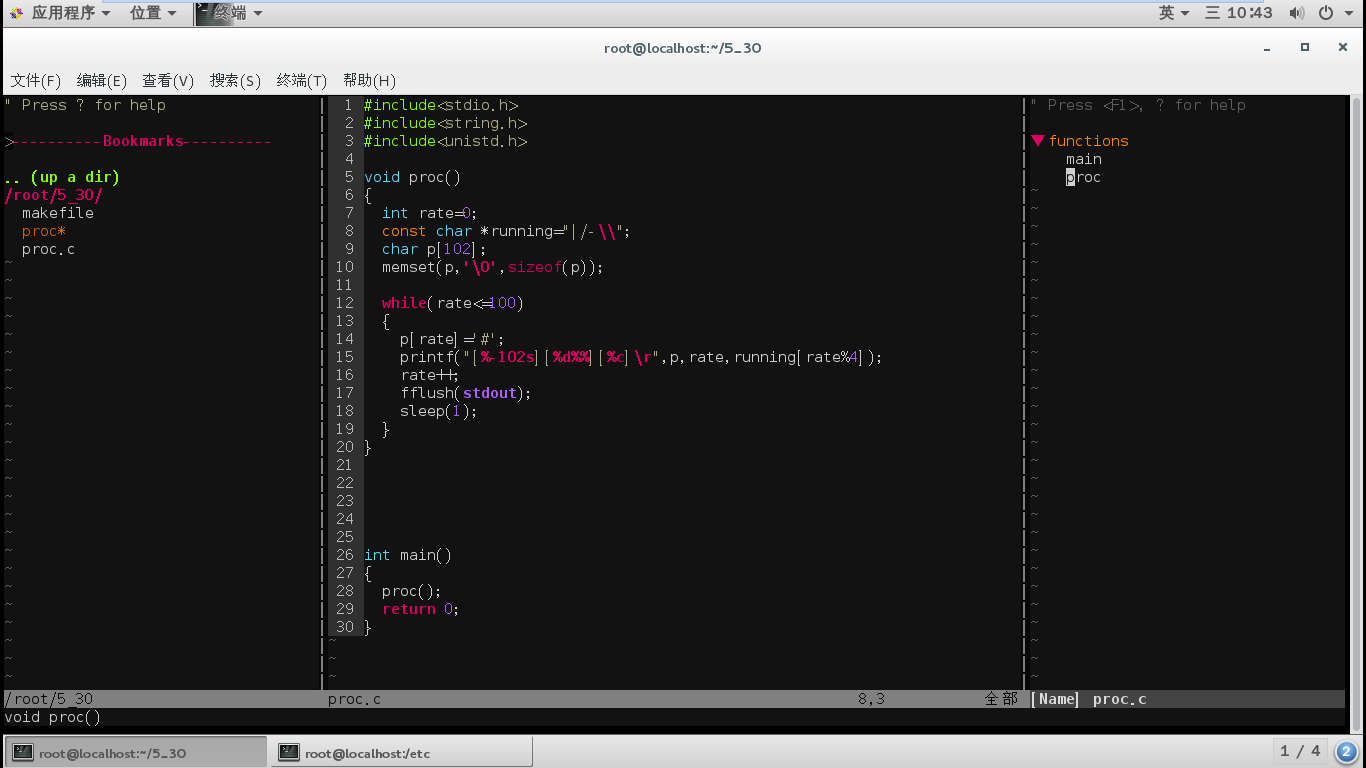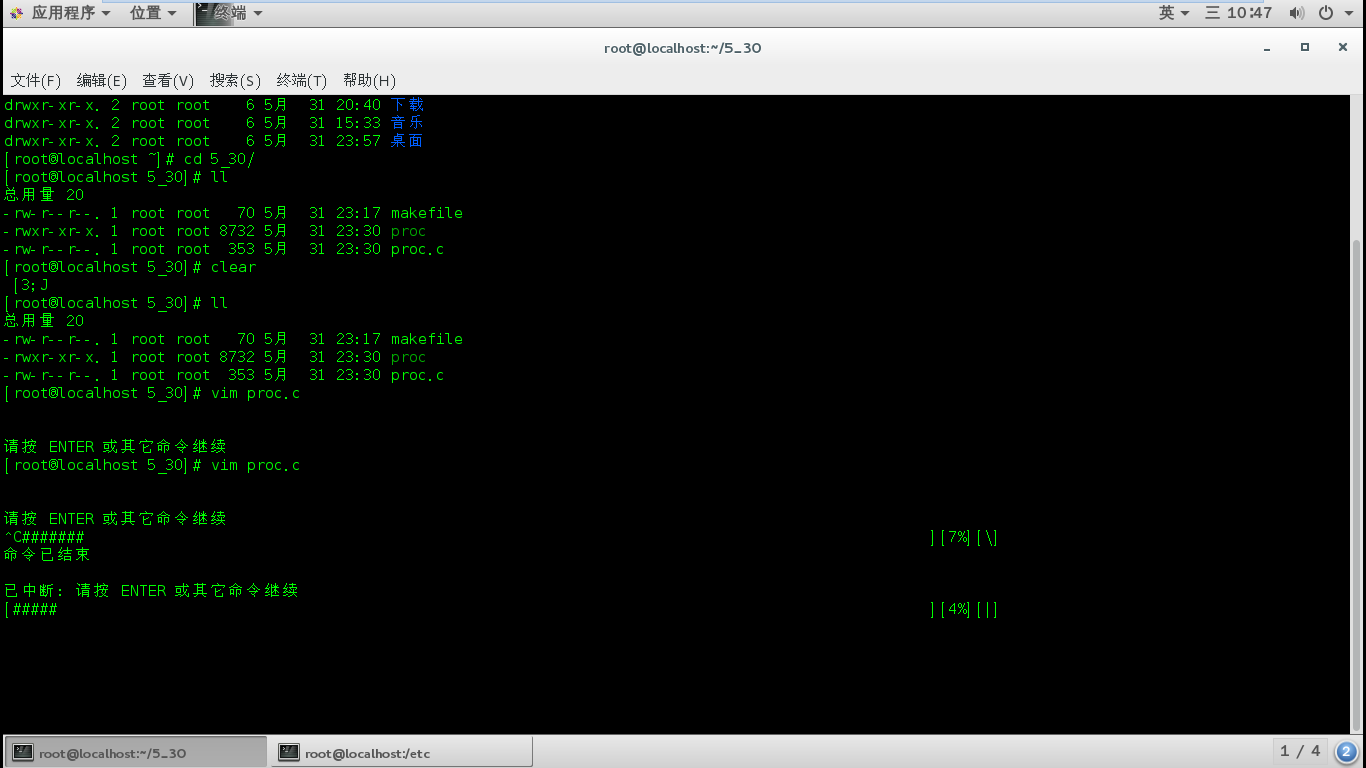實現了一個簡單的進度條,主要技術啥的算不上,但有幾個需要注意的點
首先是回車符,回車符可不是\n,我們可以把\n看成是兩個動作的合體,分別是,回車和換行,都有自己對應的符號,
這利用回車符一直在同一個位置輸出造成動態的假象因為沒有用到\n和換行,
但是C語言的printf是行緩沖輸出,什麼意思呢?就是說不滿一行不輸出,就是靠\n輸出的,沒有\n只好強制把緩沖中的數據輸出出來,這就要用到函數fflush()#include<stdio.h>
2 #include<string.h>
3 #include<unistd.h>
4
5 void proc()
6 {
7 int rate=0;
8 const char *running="|/-\\";
9 char p[102];
10 memset(p,'\0',sizeof(p));
11
12 while(rate<=100)
13 {
14 p[rate]='#';
15 printf("[%-102s][%d%%][%c]\r",p,rate,running[rate%4]);
16 rate++;
17 fflush(stdout);
18 sleep(1);
19 }
20 }
21
22
23
24
25
26 int main()
27 {
28 proc();
29 return 0;
30 }
~

附加task_struct的定義,來自http://wenku.baidu.com/link?url=cEY9RL3Rru25c76ZSrB1dx5lmtdZrocvKw33tzwbOhxlIW4EOZWfIAyQO4o8fgezvmm14TtGEehVHUiCYmjVvFGW2JkbJc9YUJaIU1f9Q3m
因為每一個PCB都是這樣的, 只有這些結構, 才能滿足一個進程的所有要求。打開/include/linux/sched.h可以找到task_struct 的定義
struct task_struct {
volatile long state; /*說明了該進程是否可以執行,還是可中斷等信息*/
unsigned long flags; /*Flage 是進程號,在調用fork()時給出*/
int sigpending; /*進程上是否有待處理的信號*/
mm_segment_t addr_limit;
/**********************************************************/
/**進程地址空間,區分內核進程與普通進程在內存存放的位置不同*/
/****0-0xBFFFFFFF for user-thead ***********************/
/****0-0xFFFFFFFF for kernel-thread ***********************/
/**********************************************************/
volatile long need_resched;
/**********************************************************/
/**********調度標志,表示該進程是否需要重新調度,************/
/**********若非0,則當從內核態返回到用戶態,會發生調度*******/
/**********************************************************/
int lock_depth; /*********************鎖深度***************/
long nice; /*************進程的基本時間片******************/
unsigned long policy;
/**********************************************************/
/*進程的調度策略,有三種************************************/
/*實時進程:SCHED_FIFO,SCHED_RR*****************************/
/*分時進程:SCHED_OTHER*************************************/
/**********************************************************/
/**********************************************************/
struct mm_struct *mm; //進程內存管理信息
int processor;
/**********************************************************/
/*若進程不在任何CPU上運行,
/*cpus_runnable 的值是0,否則是1。
/*這個值在運行隊列被鎖時更新.*/
/**********************************************************/
unsigned long cpus_runnable, cpus_allowed;
struct list_head run_list; /****指向運行隊列的指針*********/
unsigned long sleep_time; /*****進程的睡眠時間*************/
struct task_struct *next_task, *prev_task;
/**********************************************************/
/*用於將系統中所有的進程連成一個雙向循環鏈表*/
/*其根是init_task.*/
/**********************************************************/
struct mm_struct *active_mm;
struct list_head local_pages;/**指向本地頁面***************/
unsigned int allocation_order, nr_local_pages;
struct linux_binfmt *binfmt;/*進程所運行的可執行文件的格式*/
int exit_code, exit_signal;
int pdeath_signal;/*父進程終止是向子進程發送的信號*********/
unsigned long personality;
/*Linux可以運行由其他UNIX操作系統生成的符合iBCS2標准的程序*/
int did_exec:1;
/**********************************************************/
/*按POSIX要求設計的布爾量,區分進程正在執行從***************/
/*父進程中繼承的代碼,還是執行由execve裝入的新程序代碼******/
/**********************************************************/
pid_t pid;/**********進程標識符,用來代表一個進程***********/
pid_t pgrp;/********進程組標識,表示進程所屬的進程組********/
pid_t tty_old_pgrp;/*******進程控制終端所在的組標識********/
pid_t session;/*************進程的會話標識*****************/
pid_t tgid;
int leader; /*************標志,表示進程是否為會話主管******/
struct task_struct *p_opptr,*p_pptr,*p_cptr,*p_ysptr,*p_osptr;
struct list_head thread_group; /****線程鏈表***************/
struct task_struct *pidhash_next;/*用於將進程鏈入HASH表pidhash
struct task_struct **pidhash_pprev;
wait_queue_head_t wait_chldexit; /*供wait4()使用***********/
struct completion *vfork_done; /* 供vfork() 使用***********/
unsigned long rt_priority;
/****實時優先級,用它計算實時進程調度時的weight值,/*******/
/*it_real_value,it_real_incr用於REAL定時器,單位為jiffies*/
系統根據it_real_value //設置定時器的第一個終止時間。
在定時器到期時,向進程發送SIGALRM信號,同時根據
it_real_incr重置終止時間,it_prof_value,it_prof_incr
用於Profile定時器,單位為jiffies。當進程運行時,
不管在何種狀態下,每個tick都使it_prof_value值減一,
當減到0時,向進程發送信號SIGPROF,並根據it_prof_incr重置時間
it_virt_value,it_virt_value用於Virtual定時器,單位為jiffies。
當進程運行時,不管在何種狀態下,每個tick都使it_virt_value值減一
當減到0時,向進程發送信號SIGVTALRM,根據it_virt_incr重置初值。
Real定時器根據系統時間實時更新,不管進程是否在運行
Virtual定時器只在進程運行時,根據進程在用戶態消耗的時間更新
Profile定時器在進程運行時,根據進程消耗的時
(不管在用戶態還是內核態)更新*****************************/
unsigned long it_real_value, it_prof_value, it_virt_value;
unsigned long it_real_incr, it_prof_incr, it_virt_value;
struct timer_list real_timer;//指向實時定時器的指針
struct tms times; //記錄進程消耗的時間,
unsigned long start_time;//進程創建的時間
long per_cpu_utime[NR_CPUS], per_cpu_stime[NR_CPUS]; //記錄進程在每個CPU上所消耗的用戶態時間和核心態時間
/* mm fault and swap info: this can arguably be seen as either mm-specific or thread-specific */
//內存缺頁和交換信息:
//min_flt, maj_flt累計進程的次缺頁數(Copy on Write頁和匿名頁)和主缺頁數(從映射文件或交換設備讀入的頁面數);
//nswap記錄進程累計換出的頁面數,即寫到交換設備上的頁面數。
//cmin_flt, cmaj_flt, cnswap記錄本進程為祖先的所有子孫進程的累計次缺頁數,主缺頁數和換出頁面數。在父進程
//回收終止的子進程時,父進程會將子進程的這些信息累計到自己結構的這些域中
unsigned long min_flt, maj_flt, nswap, cmin_flt, cmaj_flt, cnswap;
int swappable:1; //表示進程的虛擬地址空間是否允許換出
/* process credentials *////進程認證信息
//uid,gid為運行該進程的用戶的用戶標識符和組標識符,通常是進程創建者的uid,gid //euid,egid為有效uid,gid
//fsuid,fsgid為文件系統uid,gid,這兩個ID號通常與有效uid,gid相等,在檢查對於文件系統的訪問權限時使用他們。
//suid,sgid為備份uid,gid
uid_t uid,euid,suid,fsuid;
gid_t gid,egid,sgid,fsgid;
int ngroups; //記錄進程在多少個用戶組中
gid_t groups[NGROUPS]; //記錄進程所在的組
kernel_cap_t cap_effective, cap_inheritable, cap_permitted;//進程的權能,分別是有效位集合,繼承位集合,允許位集合
int keep_capabilities:1;
struct user_struct *user;
/* limits */
struct rlimit rlim[RLIM_NLIMITS]; //與進程相關的資源限制信息
unsigned short used_math; //是否使用FPU
char comm[16]; //進程正在運行的可執行文件名
/* file system info *///文件系統信息
int link_count, total_link_count;
struct tty_struct *tty; /* NULL if no tty 進程所在的控制終端,如果不需要控制終端,則該指針為空*/
unsigned int locks; /* How many file locks are being held */
/* ipc stuff *///進程間通信信息
struct sem_undo *semundo; //進程在信號燈上的所有undo操作
struct sem_queue *semsleeping; //當進程因為信號燈操作而掛起時,他在該隊列中記錄等待的操作
/* CPU-specific state of this task *///進程的CPU狀態,切換時,要保存到停止進程的
task_struct中
struct thread_struct thread;
/* filesystem information文件系統信息*/
struct fs_struct *fs;
/* open file information *///打開文件信息
struct files_struct *files;
/* signal handlers *///信號處理函數
spinlock_t sigmask_lock; /* Protects signal and blocked */
struct signal_struct *sig; //信號處理函數,
sigset_t blocked; //進程當前要阻塞的信號,每個信號對應一位
struct sigpending pending; //進程上是否有待處理的信號
unsigned long sas_ss_sp;
size_t sas_ss_size;
int (*notifier)(void *priv);
void *notifier_data;
sigset_t *notifier_mask;/* Thread group tracking */
u32 parent_exec_id;
u32 self_exec_id;
/* Protection of (de-)allocation: mm, files, fs, tty */
spinlock_t alloc_lock;
void *journal_info;/* journalling filesystem info */
};

